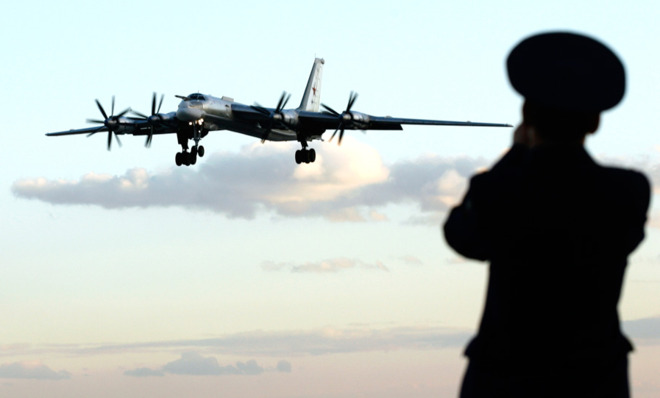Russia is stealthily threatening America with nuclear war
But it's not quite the projection of strength that it seems...

Last week, two aircraft took off from an air base in western Russia, just east of the Russian city of Saratov. The aircraft, Tu-95 strategic bombers code-named Bear by NATO, flew northwest, skirting Iceland, Greenland, and Canada.
Once beyond Canada, the two lumbering, propeller-driven bombers settled on a heading straight toward the United States. Their goal was a "launch box" off the coast of the U.S. from which, during wartime, they would fire nuclear-tipped cruise missiles towards American cities and military bases.
The provocative flights were timed to a NATO summit, attended by President Obama, then taking place in Wales. On the agenda in Wales: what to do about Russia's invasion of Ukraine.
The Week
Escape your echo chamber. Get the facts behind the news, plus analysis from multiple perspectives.

Sign up for The Week's Free Newsletters
From our morning news briefing to a weekly Good News Newsletter, get the best of The Week delivered directly to your inbox.
From our morning news briefing to a weekly Good News Newsletter, get the best of The Week delivered directly to your inbox.
Welcome to diplomacy, Putin-style, in the 21st century.
Relations between Russia and the West have taken a dark turn since Russian President Vladimir Putin returned to power in 2012. Russia's invasion of Ukraine and general unpleasantness to its pro-Western neighbors has the world wondering if it could be headed into a second Cold War.
An out-and-out Cold War, with the world carved into opposing power blocs, is unlikely at this point. Russia is now inextricably part of the global economic system, and despite its differences with NATO and the democratic West, Russia needs to participate in the system — and maintain ties with the West — to keep its economy running.
Russia has a vast array of actions it can take before it can trigger official repercussions. Provocative acts, adequately spaced, can leave an impression without generating a response. Russia is a master of this. A provocation here and there, separated in space and time, can leave an impression on policymakers without rousing their constituents into calls for action.
A free daily email with the biggest news stories of the day – and the best features from TheWeek.com
The Tu-95 Bear bomber, a gigantic 1950s-technology airplane with four sets of propeller engines, is not Russia's newest bomber. It is, however, the most reliable and capable of making long distance flights to whichever countries Russia wants to intimidate. Think of the Bear as Russia's ill-will ambassador to the world.
Russia sends Bear bombers to countries around the world whenever it needs to make a point. NATO has intercepted Bear bombers near Western Europe at least twice in the past three years, in August 2011 and April 2014. In June, two Bear bombers flew within 50 miles of the California coastline before turning back to Russia.
From bases in Russia's Far East, Bears periodically circumnavigate Japan, flying simulated attack runs against Japanese radar stations. Such flights are mainly done when Japan becomes especially vocal about the return of the so-called Northern Territories, four Japanese islands seized by the Soviet Union at the end of World War II. The message to Japan, which was twice attacked with nuclear weapons from bombers, is pretty unambiguous.
Sending Russian bombers to the borders of another country every day for a week frightens people — doing it once or twice a year merely baffles them. The government, on the other hand, gets the message. The Sept. 4 flight by two Russian bombers was a pointed message to the United States and NATO that Russia was not unaware of the meeting and that a consequence of NATO action in Ukraine could be nuclear war.
That's not the only reason for Russia's aggressive, in-your-face demonstrations of military power. By forcing the world to concentrate its attention on Russia's bombers, it diverts attention from the sorry state of the Russian nuclear arsenal.
Russia's nuclear armament is seen as the ultimate guarantor of the security of the state. In the 1990s, when Russia was undergoing a massive socioeconomic shift from state socialism to a market economy, Russia's military fell into more than a decade of poverty and disarray. Russia's nuclear arsenal, however, remained at a relatively high rate of readiness.
Weapons eventually wear out, and Russia's nuclear forces, the bulk of which date to the mid-1980s, are on an aggressive retirement schedule. Three out of four models of Russia's land-based nuclear missiles will be retired by 2020, with the fourth type, the SS-27 Sickle, set to gradually replace the others.
Russia's fleet of 12 nuclear missile submarines, designed to protect the country from a first strike by hiding nukes deep underwater, is old and worn out. Russia has only recently started building the new Borei-class missile submarines to replace them. On top of that, the new missiles destined to arm Russia's new submarines are experiencing a high failure rate. Out of 20 launches of the new Bulava long-range nuclear missile, at least eight failed.
The result is a Russia highly insecure about its ability to protect its borders. But instead of sitting back and looking weak, Russia is lashing out to give the impression of strength. It's a sleight-of-hand trick that downplays Russia's nuclear weaknesses to concentrate attention on its apparent strengths. Viewed holistically, Russia's nuclear firepower is a lot less intimidating than it looks.
[Correction: This article originally misstated elements of a nuclear missile ban. It has since been corrected. We regret the error.]
Kyle Mizokami is a freelance writer whose work has appeared in The Daily Beast, TheAtlantic.com, The Diplomat, and The National Interest. He lives in San Francisco.
-
 Why Saudi Arabia is muscling in on the world of anime
Why Saudi Arabia is muscling in on the world of animeUnder the Radar The anime industry is the latest focus of the kingdom’s ‘soft power’ portfolio
-
 Scoundrels, spies and squires in January TV
Scoundrels, spies and squires in January TVthe week recommends This month’s new releases include ‘The Pitt,’ ‘Industry,’ ‘Ponies’ and ‘A Knight of the Seven Kingdoms’
-
 Venezuela: The ‘Donroe doctrine’ takes shape
Venezuela: The ‘Donroe doctrine’ takes shapeFeature President Trump wants to impose “American dominance”